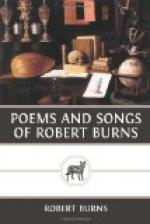But the real national importance of Burns is due chiefly to his songs. The Puritan austerity of the centuries following the Reformation had discouraged secular music, like other forms of art, in Scotland; and as a result Scottish song had become hopelessly degraded in point both of decency and literary quality. From youth Burns had been interested in collecting the fragments he had heard sung or found printed, and he came to regard the rescuing of this almost lost national inheritance in the light of a vocation. About his song-making, two points are especially noteworthy: first, that the greater number of his lyrics sprang from actual emotional experiences; second, that almost all were composed to old melodies. While in Edinburgh he undertook to supply material for Johnson’s “Musical Museum,” and as few of the traditional songs could appear in a respectable collection, Burns found it necessary to make them over. Sometimes he kept a stanza or two; sometimes only a line or chorus; sometimes merely the name of the air; the rest was his own. His method, as he has told us himself, was to become familiar with the traditional melody, to catch a suggestion from some fragment of the old song, to fix upon an idea or situation for the new poem; then, humming or whistling the tune as he went about his work, he wrought out the new verses, going into the house to write them down when the inspiration began to flag. In this process is to be found the explanation of much of the peculiar quality of the songs of Burns. Scarcely any known author has succeeded so brilliantly in combining his work with folk material, or in carrying on with such continuity of spirit the tradition of popular song. For George Thomson’s collection of Scottish airs he performed a function similar to that which he had had in the “Museum”; and his poetical activity during the last eight or nine years of his life was chiefly devoted to these two publications. In spite of the fact that he was constantly in severe financial straits, he refused to accept any recompense for this work, preferring to regard it as a patriotic service. And it was, indeed, a patriotic service of no small magnitude. By birth and temperament he was singularly fitted for the task, and this fitness is proved by the unique extent to which his productions were accepted by his countrymen, and have passed into the life and feeling of his race.
1771 — 1779
Song—Handsome Nell^1
Tune—“I am a man unmarried.”
[Footnote 1: The first of my performances.—R. B.]
Once I lov’d a
bonie lass,
Ay, and I love her still;
And whilst that virtue
warms my breast,
I’ll love my handsome
Nell.
As bonie lasses I hae
seen,
And mony full as braw;
But, for a modest gracefu’
mein,
The like I never saw.
A bonie lass, I will
confess,
Is pleasant to the e’e;
But, without some better
qualities,
She’s no a lass
for me.




